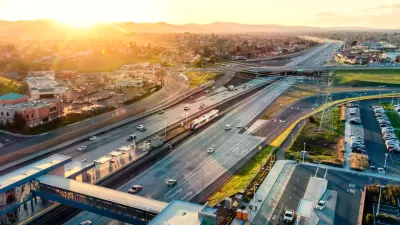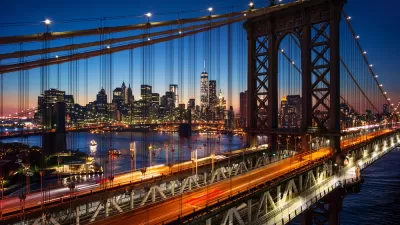Bus rapid transit (BRT) is often the most feasible, quickly implemented and cost-effective way to improve mobility in the United States, concluded a distinguished panel of transport experts at a Brookings Institution event.
The event, organized by the Latin America Initiative, invited guests to discuss lessons learned from some of the widely regarded best practices of BRT in Latin America and their applicability in the U.S., where rapid population growth, increasing congestion and shrinking municipal and federal budgets present an urgent need to find appropriate transportation and infrastructure improvements.
Panelists included Marc Elrich, councilmember for Montgomery County, Maryland; Robert Puentes, senior fellow at Brookings; Sam Zimmerman, urban transport advisor for The World Bank; and Dario Hidalgo, director of Research and Practice for EMBARQ (the producer of this blog). The discussion was facilitated by moderator Mauridio Cardenas, senior fellow and director of the Latin America Intiative at Brookings. The looming question: If BRT works so well in Latin America, how come we don't see as many examples of it in the U.S.?
Thanks to Erica Schlaikjer
FULL STORY: Latin America’s Bus Rapid Transit Boom Offers Lessons for the U.S.

Planetizen Federal Action Tracker
A weekly monitor of how Trump’s orders and actions are impacting planners and planning in America.

Maui's Vacation Rental Debate Turns Ugly
Verbal attacks, misinformation campaigns and fistfights plague a high-stakes debate to convert thousands of vacation rentals into long-term housing.

San Francisco Suspends Traffic Calming Amidst Record Deaths
Citing “a challenging fiscal landscape,” the city will cease the program on the heels of 42 traffic deaths, including 24 pedestrians.

Defunct Pittsburgh Power Plant to Become Residential Tower
A decommissioned steam heat plant will be redeveloped into almost 100 affordable housing units.

Trump Prompts Restructuring of Transportation Research Board in “Unprecedented Overreach”
The TRB has eliminated more than half of its committees including those focused on climate, equity, and cities.

Amtrak Rolls Out New Orleans to Alabama “Mardi Gras” Train
The new service will operate morning and evening departures between Mobile and New Orleans.
Urban Design for Planners 1: Software Tools
This six-course series explores essential urban design concepts using open source software and equips planners with the tools they need to participate fully in the urban design process.
Planning for Universal Design
Learn the tools for implementing Universal Design in planning regulations.
Heyer Gruel & Associates PA
JM Goldson LLC
Custer County Colorado
City of Camden Redevelopment Agency
City of Astoria
Transportation Research & Education Center (TREC) at Portland State University
Jefferson Parish Government
Camden Redevelopment Agency
City of Claremont




























